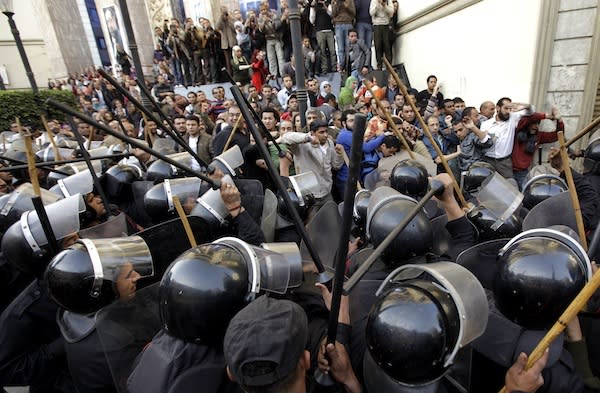 The Cutline
The CutlineEgyptian protesters utilize social media amid crackdown

Egyptian security forces have cracked down brutally on protesters since Tuesday, with more than 1,000 detained and six dead. But the government appears to be disrupting more than street demonstrations.
Over the past 48 hours, social media sites like Twitter and Facebook have been intermittently blocked as Egyptians rise up against Hosni Mubarak's authoritarian regime, which has ruled the country for nearly three decades. The power of social media—for both disseminating news and organizing protests in an authoritarian country—first drew significant attention during the 2009 protests of Iran's disputed election. More recently, Tunisian protesters utilized social media during the successful ouster of a corrupt president.
So as the Tunisian revolt spreads to Egypt (and Yemen), it's understandable that the government would want to disrupt any tools that could possibly be used to challenge state power. But despite some disruptions, the Internet has proven vital in making images and videos of the protests available to the world.
Twitter confirmed Tuesday night that the micro-blogging platform was being blocked in Egypt. And there were similar reports of Facebook being blocked, according to Herdict, a Harvard University project that tracks web accessibility through crowdsourcing. (The situation remains fluid, and some users report the social media platforms working again Thursday morning, in parts of the country.)
But even as Twitter's service is spotty (or nonexistent) in Egypt, users around the world have been able to keep tabs on the latest news from the country by following the the hashtag #jan25. In addition to on-the-ground reports, Twitter users have also linked to YouTube clips from the demonstrations that capture a perspective that few major media correspondents would be likely to get.
A YouTube clip from Tuesday, showing a protester standing in the path of a mounted water cannon, is already being described as Egypt's Tiananmen Square moment, a reference to the lone protester who faced off against Chinese tanks in 1989. You can watch the encounter below:
Meanwhile, many Egyptian bloggers have found ways around Internet restrictions to continue posting reports and videos of what's happening on the streets. The New York Times' Lede blog rounded up several videos from this week's protests, including a chilling video of security forces chasing protesters Wednesday night in Cairo. See below:
Social media sites, when accessible, have been especially crucial in the Egypt crisis since a number of independent Egyptian newspapers have seen their websites shut down. The Committee to Protect Journalists condemned these instances of media repression on Wednesday.
Still, some journalists have found ways around the media crackdown and produced compelling reports.The Guardian's Jack Shenker, one of several reporters beaten this week by Egyptian security services, managed to produce an audio recording while he was trapped with dozens of protesters in the back of a truck en route to an unknown destination. Listen to Shenker's incredible recording here. (Note: includes profanity)
(Photo of Egyptian anti-riot police confronting activists outside a journalists syndicate in downtown Cairo, Egypt on Jan. 26, 2011: (AP /Ben Curtis)
